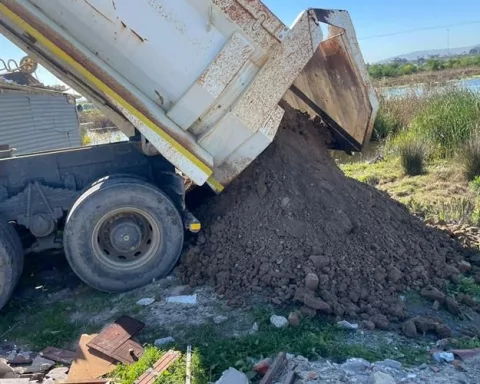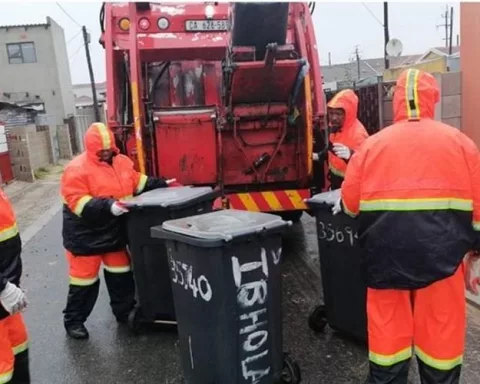Cape Town is determined to keep its urban landscape clean and free of litter, with its Urban Waste Management (UWM) By-law Enforcement Unit imposing high fines for illegal dumping and littering. In just three months, fines collected amounted to R1,615,100 for illegal dumping and R176,000 for littering, indicating a 115% increase in fines imposed compared to the previous year. The UWM also conducted surveys of businesses to ensure proper waste management practices are in place, while the city encourages residents to report illegal dumping tips and use drop-off sites for responsible waste disposal.
Cape Town’s Steadfast Pursuit of Cleanliness
Cape Town welcomes the refreshing spring season, as flowers blossom and birds fill the air with their melodies. This time of revitalization also brings a heightened emphasis on maintaining a clean environment. Cape Town’s Urban Waste Management (UWM) By-law Enforcement Unit relentlessly strives to keep the city free of litter. The substantial rise in fines for littering and unlawful dumping is a clear indication of the city officials’ commitment to preserving the urban landscape.
In just the past three months, the UWM’s persistent efforts have produced remarkable results. An astounding R1,615,100 was collected from 580 fines issued for illegal dumping, while another R176,000 came from 353 fines for littering. These figures signify a growing trend, marking a 115% increase in fines imposed during the first quarter of the 2023/24 financial year compared to the previous year.
However, this rigorous enforcement is not solely about levying penalties. It also includes a more comprehensive strategy to engage and cooperate with local businesses. The UWM team conducted surveys of establishments in areas like Bellville and Fisantekraal to ensure proper waste management practices are in place. This proactive approach enables businesses to adhere to regulations and actively contribute to a cleaner, healthier urban environment.
A City United in the Fight Against Litter
In conjunction with these surveys, officers carried out 17 operations across various central business districts, including Bellville, Kuils River, Kraaifontein, and Cape Town CBD. This extensive dedication to maintaining cleanliness reflects the city’s resolve to provide a spotless urban environment for both residents and visitors.
Alderman Grant Twigg, Mayoral Committee Member for Urban Waste Management, stressed the significance of catching and penalizing those who litter and dispose of waste unlawfully. He urged residents to participate in the #SpringCleanCT campaign, which offers monetary rewards for information leading to convictions for illegal dumping. Twigg’s faith in the power of collective effort serves as a driving force inspiring positive change within the Cape Town community.
Residents can support this cause by reporting illegal dumping tips to the 24-hour toll-free number (0800 110077). By sharing valuable information, citizens play a vital role in safeguarding their communities and the environment.
The City of Cape Town also recommends that residents and small businesses make use of the city’s drop-off sites for responsible waste disposal. These facilities, which allow up to three 1.5-tonne loads per day, offer a convenient and environmentally friendly waste management solution.
A Brighter, More Sustainable Future for Cape Town
The invigorating spring season in Cape Town serves as a reminder of the potential for renewal, both in nature and urban spaces. The city’s unwavering dedication to cleanliness, combined with the collaborative efforts of businesses and residents, fosters a sense of pride and responsibility. Moreover, the UWM’s vigilant enforcement of penalties for littering and illegal dumping sends a resounding message: Cape Town is devoted to preserving its beauty and building a sustainable future for all who call it home.
As the city’s landscape undergoes a transformation with the arrival of spring, so does the vigilance of its inhabitants. The joint responsibility for cleanliness and environmental protection is a formidable force propelling Cape Town towards a brighter, more sustainable future. The combined efforts of the UWM, local businesses, and residents enable the city to thrive as an exemplary model of urban renewal and environmental guardianship.
1. What is Cape Town’s Urban Waste Management (UWM) By-law Enforcement Unit?
The UWM By-law Enforcement Unit is a division of the City of Cape Town that enforces laws related to waste management and littering within the city.
2. What fines have been imposed for illegal dumping and littering in Cape Town?
In just three months, fines collected amounted to R1,615,100 for illegal dumping and R176,000 for littering. This marks a 115% increase in fines imposed compared to the previous year.
3. What is the UWM doing to ensure proper waste management practices are in place?
The UWM is conducting surveys of businesses, particularly in areas such as Bellville and Fisantekraal, to ensure proper waste management practices are in place. This proactive approach enables businesses to adhere to regulations and actively contribute to a cleaner, healthier urban environment.
4. What central business districts have had operations carried out by the UWM?
The UWM has carried out 17 operations across various central business districts, including Bellville, Kuils River, Kraaifontein, and Cape Town CBD.
5. What is the #SpringCleanCT campaign, and how can residents participate?
The #SpringCleanCT campaign is an initiative that offers monetary rewards for information leading to convictions for illegal dumping. Residents can participate by reporting illegal dumping tips to the 24-hour toll-free number (0800 110077).
6. What can residents and small businesses do to dispose of waste responsibly in Cape Town?
The City of Cape Town recommends that residents and small businesses make use of the city’s drop-off sites for responsible waste disposal. These facilities allow up to three 1.5-tonne loads per day and offer a convenient and environmentally friendly waste management solution.
7. What is Alderman Grant Twigg’s message to Cape Town residents regarding littering and waste disposal?
Alderman Grant Twigg, Mayoral Committee Member for Urban Waste Management, stresses the significance of catching and penalizing those who litter and dispose of waste unlawfully. He urges residents to participate in the #SpringCleanCT campaign and have faith in the power of collective effort to inspire positive change within the Cape Town community.
8. What does Cape Town’s dedication to cleanliness and environmental protection signify for its future?
The city’s unwavering dedication to cleanliness, combined with the collaborative efforts of businesses and residents, fosters a sense of pride and responsibility. The combined efforts of the UWM, local businesses, and residents enable the city to thrive as an exemplary model of urban renewal and environmental guardianship, propelling Cape Town towards a brighter, more sustainable future.












